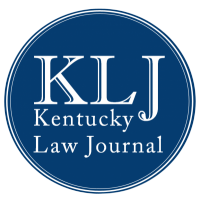Blog Post | 108 KY. L. J. ONLINE | Feb. 18, 2020
Casting Lumos on Protections for Defendants in the Wizarding World
Erica Ashton
J.K. Rowling’s Wizarding World is carefully designed to include power structures familiar to us “muggles.” But while readers are regularly exposed to the Ministry of Magic—the Wizarding World’s executive branch—this world’s judicial branch is largely a mystery. The trial described in Harry Potter and the Order of the Phoenix gives a small glimpse into the legal system governing witches and wizards.[i] Applying the U.S. Constitution and Federal Rules of Evidence to this trial shows how drastically insufficient the protections are for magical defendants.
The summer before Harry’s fifth year at Hogwarts, he is charged with “knowingly, deliberately, and in full awareness of the illegality of his actions . . . produc[ing] a Patronus Charm . . . in the presence of a muggle” and summoned to appear before the Wizengamot, a group of fifty wizards that seems to be equivalent to the United States Supreme Court.[ii] The fact that a minor is initially tried by such a group for a relatively trivial offense is only the beginning of this judicial body’s concerning procedures.
The Wizengamot’s most significant shortcoming is its lack of separation of powers.[iii] If this trial had occurred in an American court, Cornelius Fudge would have served at President of the United States, Chief Justice of the Supreme Court, and U.S. Attorney.[iv] The other two interrogators also hold political roles as Head of the Department of Magical Law Enforcement (analogous to the Attorney General) and the Senior Undersecretary to the Minister (likely a cabinet position).[v]
Acting as the prosecutor, Fudge admits evidence of Harry’s “prior bad act” of underage use of a Hover Charm[vi] in violation of FRE 609.[vii] First, the warning Harry received for this offense—if a warning is considered an “adjudication” at all—would not be admissible because he was just 12 years old when it was issued.[viii] Even if this were not the case, it is unlikely the probative value of this warning outweighs its prejudicial effect,[ix] especially given the significant prejudice the Wizengamot displayed against Harry. Further, Fudge’s questioning of Harry is a lesson in leading questions, a violation of FRE 611.[x]
Now acting as a witness, Fudge attempts to use his opinion of Harry’s character to discredit him.[xi] In the American system, Fudge would not have been permitted to testify at all because judges cannot serve as witnesses.[xii] However, it is clear the Wizengamot has little concern about trial integrity. If Fudge were a proper witness, this testimony would be covered by FRE 608.[xiii] While his general belief that Harry is a liar would be admissible, his attempts to use specific instances of Harry’s conduct that comport with that belief would draw an objection.[xiv]
Fortunately, Harry had an effective advocate in Albus Percival Wulfric Brian Dumbledore (who for an unclear reason identified himself as a “witness for the defense”).[xv] The Wizengamot Charter clearly does not provide for appointment of counsel, given the judges’ collective shock at his presence.[xvi] But Dumbledore’s defense strategy of presenting an eyewitness and focusing the judges on the issue at hand saved the boy who lived to live another day.
[i] J.K. Rowling, Harry Potter and the Order of The Phoenix 137-51 (1st ed. 2003) [hereinafter Rowling, Order of the Phoenix].
[ii] Id. at 138, 140.
[iii] See The Federalist No. 47 (James Madison).
[iv] See Rowling, Order of the Phoenix, supra note i, at 138-41 (demonstrating Fudge’s role as Minister of Magic, member of the Wizengamot, and interrogator.)
[v] Id. at 138-39.
[vi] Though of course we know this was the rogue house-elf Dobby’s wrongdoing, not Harry’s. J.K. Rowling, Harry Potter and the Chamber of Secrets 19-20 (1st ed. 2000) [hereinafter Rowling, Chamber of Secrets].
[vii] Fed. R. Evid. 609.
[viii] Rowling, Chamber of Secrets, supra note vi, at 20-21; Fed. R. Evid. 609(d).
[ix] Fed. R. Evid. 609(a)(1)(B).
[x] Fed. R. Evid. 611, see Rowling, Order of the Phoenix, supra note i, at 140.
[xi] Rowling, Order of the Phoenix, supra note i, at 148.
[xii] Fed. R. Evid. 605.
[xiii] Fed. R. Evid. 608.
[xiv] Rowling, Order of the Phoenix, supra note i, at 142, 148. Compare Fed. R. Evid. 608(a) with Fed. R. Evid. 608(b).
[xv] Rowling, Order of the Phoenix, supra note i, at 136.
[xvi] U.S. Const. amend. VI.

